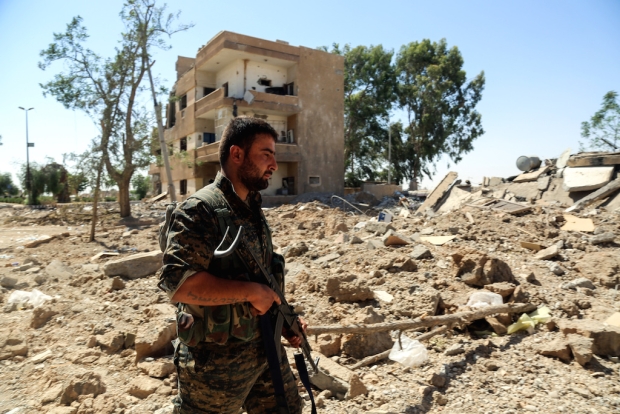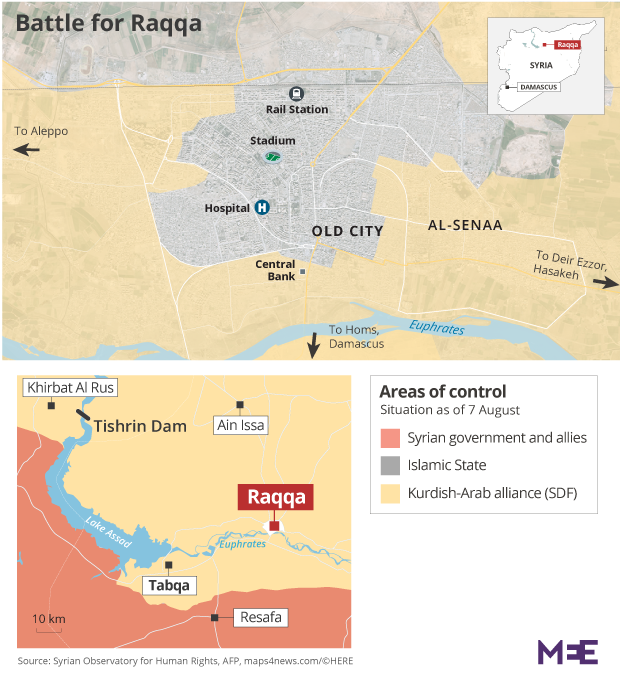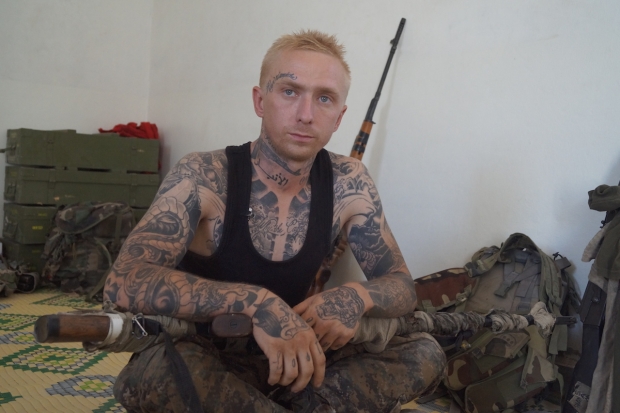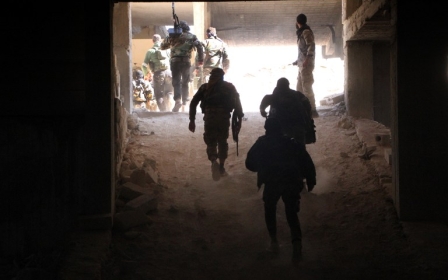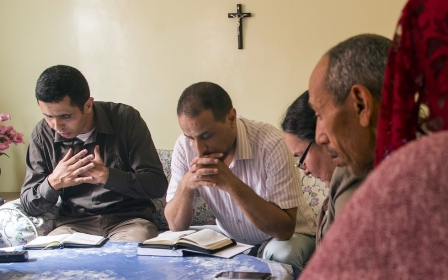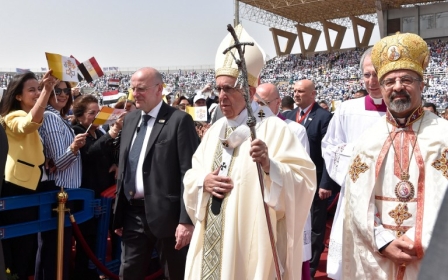'We must defend ourselves': Christian fighters on warpath in Raqqa
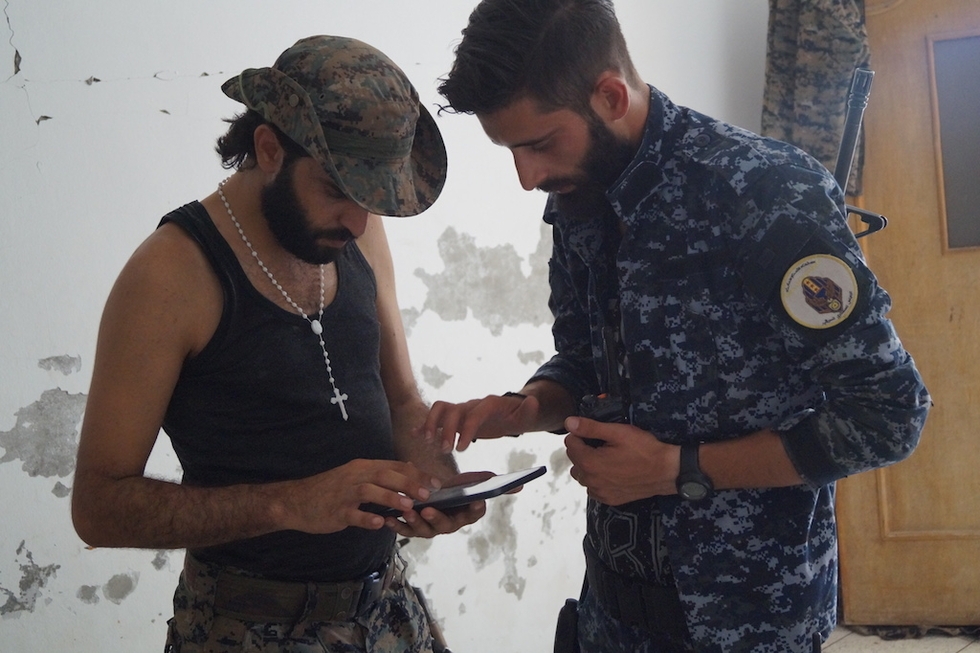
RAQQA, Syria - On the front line against the Islamic State (IS) group in its Syrian capital Raqqa, a battalion of crucifix-wearing fighters is preparing to unseat the militants in a fight for the survival of their co-religionists.
The Syriac Military Council (MFS) was first established in 2013 to protect the Christian Syriac (also known as Assyrian) community and fight against IS. According to a spokesperson, the MFS has around 200 fighters in the Raqqa operation including 50 inside the city.
We don't need another genocide against us, it's enough. We used to be poor before, but now we are like a volcano
- Matay Hanna, MFS fighter
They are part of the US-backed coalition of Arab and Kurdish fighters known as the Syrian Democratic Forces (SDF).
Matay Hanna, 22 years old, has fought with MFS for about five years.
"We conduct our own special training sessions, and we receive training from the Americans and other forces," he told MEE.
Brett McGurk, the anti-IS coalition envoy, specifically mentioned the Christian Syriac community in a media briefing last Friday, describing them as an integral part of the SDF, created in October 2015.
"So therefore we had to have an umbrella that would bring in as many people as possible – Kurds, Arabs, Christians, Syriacs, all these guys – working together as a cohesive force, not working together as different units, which is not militarily effective," he said.
"They're full of Sunni Arabs, they're full of Christians, they're full of people from these areas who want to liberate their towns," he stated.
Before IS came, there were hundreds of Christians living in Raqqa city, and there were two churches.
"But now 95 percent of them are living safe in Qamishli," Hanna told MEE, a city in Hasakah province on the northeastern border with Turkey.
Some Kurds and Christians have openly wondered why Kurdish or Christian fighters would go to a majority Arab city, but for Hanna – who is originally from the northern town of Qamishli - "Syria is Syria".
"The terrorists are our enemies. It's dangerous for Arabs, Kurds and Christians. Maybe the city is 98 percent Arab, but we are fighting together, we are like brothers," he said.
"All of us are humans, but Daesh is a danger to our Christian people. They hurt us in Iraq, Egypt, and also in Syria. People run away from their houses, such as in Tal Tamr and Hasakah," Hanna said, referring to February 2015 when IS overran two Christian villages and took over 100 civilians hostage in Hasakah province.
IS has destroyed churches and Christian shrines in Syria, and demanded that Christians living under its rule pay a tax known as jizya.
While back in 2015 IS was still on the offensive in northern Syria, kidnapping Kurds and Christians, now the SDF forces are attacking the group's de facto capital in Syria. The group was also recently routed from its Iraqi capital in Mosul.
"Of course MFS places an emphasis on fighting for what they regard as their own areas, but it is not just a local self-defence group," said Carl Drott, a doctoral student in sociology at the University of Oxford, who is researching Christians in the Middle East.
"Ultimately they are fighting for political goals. Fighting IS is a way to prove themselves in the eyes of their allies, their own people, and other communities. They want to show that Assyrians, Chaldeans, Syriacs [Christians] are doing their share of the fighting, and in this way earn their rights as a community," he said.
"It should also be mentioned that there were some Assyrians, Chaldeans and Syriacs as well as Kurds living in Raqqa before IS took over. A town or city does not just belong to its majority population," he added.
The Christians in the Middle East have been subject to extreme violence long before IS came along - most notably during the genocide of Armenians, Chaldeans, Syriacs and Greeks during the First World War in Turkey between 1915 and 1917.
Despite this, church leaders have largely urged their followers to remain peaceful, rather than fight.
"Although there is an old warrior tradition among Assyrians, Chaldeans, Syriacs, as well as a heritage of oppositional politics, the traditional approach of church leaders has been to ensure the survival of their community by keeping their heads low, rather than fight back," Drott said.But the MFS fighters say Christians have now stopped turning the other cheek to IS.
"Some say we are Christians and we must love everyone," Hanna said. "But if we do that there will be no Christians left in the Middle East. We are Christians and should defend our people," he said.
"We don't need another genocide against us, it's enough. We used to be poor before, but now we are like a volcano," he added. "We had a genocide in Turkey against us in 1915, we must make this a red line for us."
"We must defend ourselves."
Foreign volunteers
The oppression of Christians in the region has also encouraged Western volunteers to join the MFS, they say.
"When I learned about their cause, I had to come to them, I had to be here," Kevin Howard, 28, from San Francisco, told MEE.
"They are very unique people [Syriac Christians], almost none of them are left. IS did what they could to completely eradicate them," he said, using another name for the group.
The former US Marine has been in Raqqa for over two months. "I have been here since they took the first building, I am very tired," he said.
And even for a former professional soldier, the fight is not an easy one.
"Raqqa was an IS base for years, we are fighting here against two cities: one underground, and one on the street level," Hanna said, referring to the many tunnels that IS has dug under the city.
"We are moving slowly, because IS are using civilians to defend themselves, and we are moving carefully to save civilians," he said.
"The main target is to save civilians, the second is to finish IS."
However, he said the US-backed local forces do not want to destroy Raqqa.
"Our target is not to destroy - we need all the buildings. We want Raqqa's people to come back after the operation, and return to a normal, safe life, with human rights," he said.
He said there are roughly 1,000 to 1,500 IS militants left in Raqqa.
"Maybe more, but we don't have any problem, if they are one or 10,000," he said, confidently.
Hanna, on a Samsung tablet, scrolled over a map of Raqqa city normally used to pinpoint IS targets.
It showed one completely destroyed church, and another still intact.
"IS is using it [as a bank] to take away money from Syriacs and locals, one was destroyed, one is used by IS," he said.
The MFS fighters hope that Christians can soon return to Raqqa.
"We will fix the church, or build a new church," Hanna concluded. "We will finish this mission, and let the people go back to their homes."
This article is available in French on Middle East Eye French edition.
Stay informed with MEE's newsletters
Sign up to get the latest alerts, insights and analysis, starting with Turkey Unpacked
Middle East Eye delivers independent and unrivalled coverage and analysis of the Middle East, North Africa and beyond. To learn more about republishing this content and the associated fees, please fill out this form. More about MEE can be found here.


